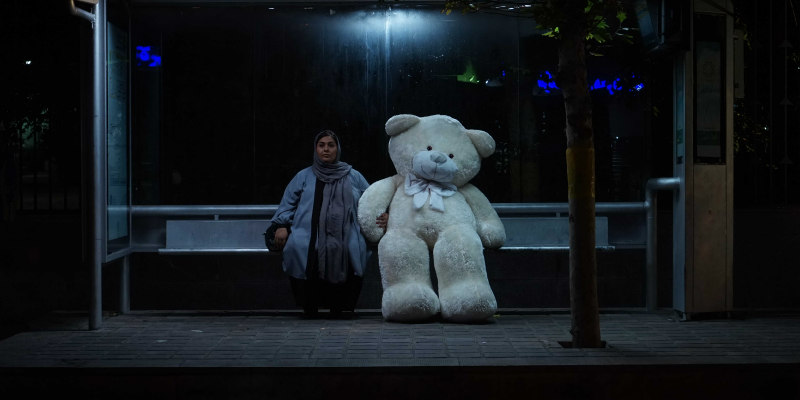Review by
Benjamin Poole
Directed by: Ali Jaberansari
Starring: Forough Ghajabagli, Mehdi Saki, Amir Hessam
Bakhtiari, Behnaz Jafari

A few months ago, a friend of mine was left by her husband. As a bystander
you are very limited in what you can do in terms of support and sympathy in
such cases: the hermetic nature of relationships means that each one is
their own private beast, with each particular coupling held together by its
own idiosyncrasies and peccadilloes which an outsider could and should
really never get to grips with. And so, when a relationship breaks up, you
feel like the loneliest person in the world (I would imagine). There's a
reason why they call them "your partner," after all. Back to my abandoned
mate; at the time, everyone sort of made the right sad noises and soothingly
intoned platitudes about "giving it time" and suchlike. But I'm there
thinking, fuck that. Being single, living your life unattached to another
person, open to the unlimited opportunities of life and love and lust, it's
like being given the keys to Paradise every single evening. Being single
makes each day a potential thrill, every night a new adventure. Time to step
up, homegirl! I mean, do you ever see films about "couples" who are "happily
in love"? No, you do not, because it would be deeply boring. Now, I realise
that this is not a popular opinion (an awareness reinforced by reactions to
it over the last few months), but it's a point of view which allows a
certain reading of Tehran: City of Love, Ali Jaberansari's dry-as-martini funny and deeply human study of
three lovelorn individuals in the Iranian capital.

My internet dictionary defines the adjective "lovelorn" as "being without love"; a condition so imperative that we have a name for it. Our hapless trio are in turn defined by their singledom: there is Hessam (Amir Hessam Bakhtiari), a deeply closeted bodybuilder; Mina (Forough Ghajabagli), an embittered receptionist who is what society's so-so hegemonies consider "overweight"; and (most sad) Vahid (Mehdi Saki), a religious/club singer who is dumped (BY PHONE FOR SHAME) by his Mrs at the start of the film.
[ READ MORE: New Release Review - Rodeo ]
Instead of luxuriating in their singledom, each of our characters feel incomplete, as if not being with someone means that they are somehow not valid. It is this social ennui that Tehran: City of Love presents; this hope we have that being with someone will in some way accomplish our existence. Apart from Hessam, it's not as if the characters even have a specific object of desire who they pine for from afar (which is, I will admit, a killer). Instead they have an intangible longing which they believe partnering up will fulfil. When Vahid is given the elbow over the phone his main concern is looking destitute in front of his parents, and the break-up sends the shy man into malaise, which manifests in him singing dirges at the work-for-hire which is his living.
Mina works at a cosmetic surgeon's, a loaded location which implicates how we are willing to chop and change our own flesh and blood not for ourselves (in this film, at least), but in order to better appeal to some unmet Prince or Princess Charming (apparently Tehran has the highest nose surgery rate in the world ☹) she spends her day recording the numbers of insecure men who book appointments, and her evenings putting on a sexy voice and anonymously ringing them up to meet on a date, which she then stands up at a distance (it is savage).
[ READ MORE: New Release Review - Love According to Dalva ]
Which leaves Hessam, the character whom the film reserves its true heart
for. A muscle-bound lug with my favourite ever hair style (receding and
pulled back into a ponytail), who finds himself falling for a younger gym
bunny, and becomes increasingly more infatuated with the handsome young
buck. But even this understandable dynamic is not without insinuation: is
this straightforward lust, or is it fortified by Hessam's fading fortunes
and the first cold shudders of a midlife crisis? I'm not one for giving a
film points for political/social representations (it's all about the art,
maaaan), but it's worth remembering that in Iran being in the gays is
illegal, so fair play for this tender and poignant portrayal of forbidden
desire. The pseudo-courtship is played out in coded visual puns: both lads
sitting on a sofa giving it mutual wrist action as they shake their protein
drinks, smoothly potting the balls and holes of a pool table and, of course,
pumping for all they are worth in the gym. Bakhtiari is a magnetic presence,
moving through the film with the heavenly grace of someone who will never
ever need to prove their strength, and exuding a palpable and resigned
sadness.

As the knowing irony of its title becomes increasingly clear, we see Tehran: City of Love exploring not relationships per se, but instead presenting three studies of loneliness, and the ensuing hopelessness of attempting to remedy that solitude through connections with other people, rather than the characters working it out on their own terms. For example, no one calls Mina fat, it is her own self-perception which leads to her spiteful actions. What makes Tehran: City of Love so compelling is its good humour and complete lack of pity for its characters, whom it never patronises. This is a rather lovely and witty film which has an abundance of affection and understanding for its star-crossed triumvirate. Maybe I'll show it to my pal.

Tehran: City of Love is on MUBI UK
now.

